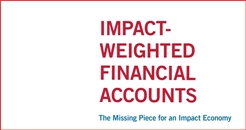 Impact-Weighted Accounts
Impact-Weighted Accounts
From an article by the Institute of Chartered Accountants England and Wales
The legitimacy of a business should depend on its ability to create value for society. Companies that create value for investors, workers, customers, suppliers and the larger ecosystem are evidence of businesses’ power to increase collective wellbeing.
Directors and executives who manage companies should aim to combine resources (raw materials and labour) in strategic ways that create more value than they consume. Once they have developed a business model that creates significant value, a company’s managers need to decide how to allocate this value among stakeholders, including workers, suppliers, investors and customers.
Currently we measure a company’s performance by the value that accrues to its shareholders. We use agreed financial reporting standards across the globe to distil a company’s revenues and expenses into a single figure that represents the value accrued to the company’s owners during a given period i.e. its earnings in currency terms. What if we changed this to alternative agreed standards of assessing a firm’s performance that measures the total value created by the firm in multiple dimensions rather than just one.
The Impact-Weighted Accounts Project run by Harvard Business School aims to do this. Its mission is to drive the creation of financial accounts that reflect a company’s financial, social and environmental performance. The idea is to create accounting statements that capture external impacts in order to drive investor and managerial decision-making. It is all about measuring and comparing impact, and about reimagining capitalism.
“We have been working in the field of sustainability metrics for a long time,” says Professor George Serafeim, Chair of the Impact-Weighted Accounts Project. “Organisations such as the Sustainability Accounting Standards Board, the Global Reporting Initiative and the Carbon Disclosure Project have made a big difference. We have seen that those metrics are becoming financially material, so they are important for the value-creation process. Which of those metrics are material depends upon the operating context of the industry that you are in and its geography. We have seen that disclosure and transparency actually makes a difference in terms of changing organisational behaviour and markets.”
The work being undertaken at the Impact-Weighted Accounts Project seeks to redefine what success means for corporations. If the purpose of the corporation extends beyond shareholder maximisation to something broader like providing profitable solutions to the world’s challenges, many of the challenges we are facing will be addressed.
Non-financial metrics are converted to financial metrics so that the impacts can be reflected in financial statements. The way that is done is to take non-financial metrics and then focus on outcome-based metrics. These are translated into the kinds of numbers companies understand – like dollar values – and concentrates on three main areas: environmental impact, employment impact and product impact. This enables management to make better decisions - procurement decisions, hiring decisions, product development, new service delivery, and so on, will all benefit from this thinking,
“Today there are organisations that look very profitable, but they have a very negative impact. They are ‘cheating’. Then there are organisations that are very profitable and have a very positive impact. Those are the true leaders of the 21st century,” says Professor Serafeim.
By adopting this framework, a company can measure both its impacts within its own operation across time, but also externally against its competitors. The more transparency we have about those impacts the more we will find there will be a race to the top rather than a race to the bottom.
Is your business willing to adopt?
Read the full article here.
Retweet about this article:
From an article by the Institute of Chartered Acco, 13/01/2021